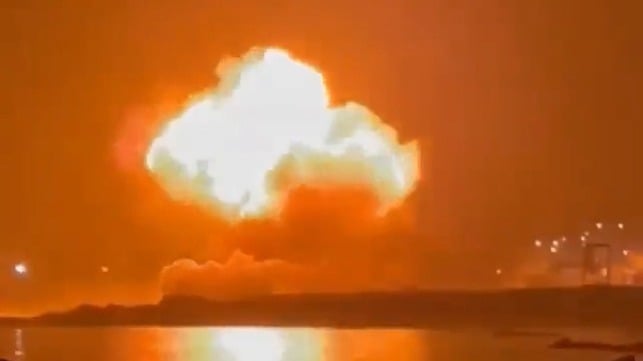Ukraine Hits Port of Tuapse for a Third Time in Long-Range Strike

Ukrainian forces have conducted another long range drone strike on the port of Tuapse, Russia, the third such attack in as many months. One pier was hit and it is possible that a small product tanker was damaged, according to open source intelligence analysts, though official Russian sources deny that any infrastructure damage occurred.
The port of Tuapse is home to a Rosneft-operated oil terminal, which serves a nearby refinery. It can handle Aframax tankers up to about 110,000 dwt, and it normally exports about 17 million tonnes of crude and refined product per year. It is the second-largest Russian oil port on the Black Sea, after Novorossiysk.
Overnight Sunday, a flotilla of naval drones made a long-range attack run on Tuapse's oil terminal, according to Ukrainian media and military analysts. After reportedly departing the Odesa region and crossing the full width of the Black Sea, the drone force attempted to enter Tuapse. At least two explosions were recorded within the port's harbor in the early hours of Monday morning.
A truly infernal video has surfaced from tonight’s attack by Ukrainian forces on the Tuapse seaport. The massive explosion points to a serious payload carried by an USV. Extra credit goes to the cameraman, who happened to be in the right place at the right time pic.twitter.com/wV2bzOC0J9
— Tatarigami_UA (@Tatarigami_UA) November 10, 2025
Authorities in Tuapse reported the destruction of four drone boats at sea. Both naval and airborne drones were reported, and anecdotal reports indicate that heavy Flamingo or Neptune cruise missiles may have been deployed as well. Bystander videos from Tuapse show a large crater in the middle of a nearby public beach, and a flattened storage shed - signs of a heavy hit located well inland from where a seaborne drone could strike.
A truly infernal video has surfaced from tonight’s attack by Ukrainian forces on the Tuapse seaport. The massive explosion points to a serious payload carried by an USV. Extra credit goes to the cameraman, who happened to be in the right place at the right time pic.twitter.com/wV2bzOC0J9
— Tatarigami_UA (@Tatarigami_UA) November 10, 2025

that matters most
Get the latest maritime news delivered to your inbox daily.
According to Reuters, Russian rail operators have suspended train service to the port of Tuapse because there is not enough capacity to handle the volume. The terminal is reportedly shut down pending repairs, and satellite imaging shows that its oil terminal berths are empty.
Tuapse is far from the only target: Ukraine has hit oil and gas infrastructure across Russia since this summer, and has taken an estimated 20 percent of all Russian refining capacity offline with long-distance drone strikes.
